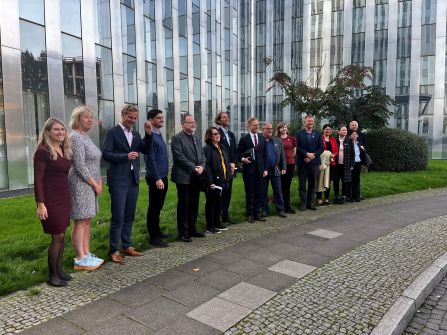
Seven state-level legislators from Canada and the United States came to Germany in October to learn about the German climate and energy transition and discuss climate and energy approaches from their own jurisdictions. A packed 6-day agenda brought together stakeholders from several levels of government, civil society, and the private sector for a mix of in-depth discussions and site-visits aimed at spurring mutual exchange on how we can realize our dual imperatives of ambitious climate policy and energy security, all whilst making it affordable and just.
Climate policy commitments despite energy challenges
It is no secret that Germany has been at the center of an unfolding geopolitical conflict and had to rapidly uncouple itself from Russian energy. Germany, in the course of 2023, managed to completely ween off Russian gas, which had up until the end of 2021 represented around half of the energy inputs in the heating sector. At the same time, the message from the government has been clear, the short-term emergency measures taken to cover energy short-falls, do not compromise climate targets. This balance was a key question for the legislators who from their own state contexts, often are faced with policy questions that pit security and reliability against integration and expansion of renewables. Deep-dive discussions and meetings with government stakeholders and the German Energy Agency, laid out clear policy plans and visions for highlighting how these imperatives can indeed be mutually supportive.
Photo credit: Transatlantic Climate Bridge
Unwavering ambition drives change
Clarity, targets, clear messaging. These matter not only for political continuity but are paramount to private sector investment strategies, and in some cases are the drivers of even more ambitious policy themselves. Meetings with thyssenkrupp steel and RWE among others, made it clear that, not only does the private sector share the stance that the transition is the (only) path forward, but with the assurance of locked in market mechanisms, federal and supranational policy frameworks, and support programs, that companies can push the acceleration and adoption of climate-friendly energy and products.
Photo credit: Transatlantic Climate Bridge
Transition means a circular approach
Wholistic planning means first looking back to look forward. The legislators spent an afternoon driving around the open-pit mine “Garzweiler” where they were shown not only how lignite was mined, but how the landscape was regenerated afterwards. Previously mined land had been refilled and carefully replanted with a mix of native flora and fauna as well as made available for agricultural usage, with wind turbines scattered between the plots. Similarly, on another site visit to the Emscher in Castrop-Rauxel, a river, which up until recently carried raw sewage, has now been transformed and rehabilitated back to its natural state, with vibrant wildlife and a green getaway for surrounding cities.
Photo credit: Transatlantic Climate Bridge
The ideas are out there, we just got to talk about them
Taking a step back and looking at how we do things and talking to others who are working on similar issues can help us rethink what’s possible, how seemingly at-odds objectives are in fact complementary, and that often solutions can in fact be quite easily transposed, with the necessary expertise and the right amount of political will. The seven legislators from the Midwest U.S. and Canada had an opportunity not only to learn about the approaches and progress in Germany, but also leave behind their own ideas.

